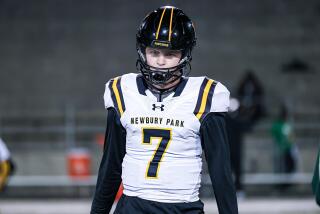Trampoline training? Newbury Park receiver Tanner Prescott is creative amid pandemic
- Share via
Suzanne Prescott, the mother of 18-year-old Newbury Park receiver Tanner Prescott, encouraged her son from the beginning of school closures last March to keep moving forward while constantly asking the question, “Are you happy?”
She’d take photos and videos of him doing backflips while trying to catch a football on a trampoline in the backyard. She laughed while capturing him shoveling snow as a strength-training exercise during a family vacation in Mammoth. She approved of him riding a mountain bike on an eight-mile trail in Sycamore Canyon that led to the beach.
She’d watch him sit at a desk at home staring into a computer screen day after day for his online classes while wondering about the ramifications and consequences of the global pandemic.
“He’s alone here,” she said by phone. “There’s really not a lot of socialization. The football team and track team have been his extended family. There’s no one to hang out with in our pod. It worries me . . . but he’s doing great.”
For all the tales of parents in panic mode willing to risk the health of their kids by sending them to competitions that violate state health guidelines, under the impression games are needed to get a scholarship or required to keep their kids emotionally intact, there are many more families dealing with the once-in-a-lifetime pandemic by being creative.
On Super Bowl weekend, during a time when there hasn’t been an official high school football game played in California since Dec. 14, 2019, let’s salute those teenagers refusing to let their dreams and aspirations fade away.
“They can still show coaches their character, their values, their grit and their ability to persevere. Even as their hearts break,” Suzanne wrote in an email explaining the journey of a mom rooting for her sports-loving son.
Tanner got all A’s on his report card last semester even though he acknowledges, “I’m more of a visual learner. I like being showed if I don’t understand something. I’d much rather be in school.”
Tanner has responded to COVID-19 by embracing his love for the outdoors. He goes mountain bike riding, hiking and skiing. He has his own organic garden. He’s considering Puget Sound, Montana and Montana State for college to perhaps become a biologist.
He works on catching passes with his own JUGS machine at home. He lifts weights in the garage. He’s a hurdler in track, so the trampoline keeps improving his agility. He once did gymnastics several days a week and earned a black belt in Taekwondo when he was 8. He’s never missed a day of school in four years at Newbury Park.
“It’s unfortunate we haven’t been able to have a season,” he said by phone. “It’s made me a little bit sad not being able to get out there as team and have the brotherhood we have and improve with the coaches.”
In December, Tanner was part of a group of players seeking to gain Gov. Gavin Newsom’s attention with pleas on Twitter.
“I’ve been sitting at a computer doing Zooms for almost a year now,” he said wearing a mask and talking in front of a giant Redwood tree in his background. “It doesn’t feel good to stare at a screen all day. I miss my teammates, the game of football and everything I get from being part of a team belonging to something bigger than just myself. Gov. Newsom, let us come back.”
It’s a delicate balancing act for parents while figuring how sports fit in. For some, sports mean everything. They’re the ticket to college for their son or daughter. For others, being on a team provides life lessons that can’t be duplicated anywhere else. That’s why mothers and fathers are in uncharted territory feeling frustrated and uncomfortable with 10 months of sports inactivity for their sons and daughters.
“I don’t know what it is going to do to him,” Suzanne said. “That’s my fear. Yes, he’s learning adversity. But there’s so much you learn from being on a team. You can’t get it anywhere else ... He’s very self-reliant, but I want my kid to be with other kids.”
Some parents have chosen to travel around the country to expose their children to competitions allowed in other states. Others are paying big bucks to participate in club programs that ignore state health guidelines in the name of “helping kids.” Others have no choice but to stick it out at home because they don’t have the resources to join the “pay-to-play crowd.”
Suzanne and her husband, Darrin, a film director, have paid close attention to what works best for their son.
“Honestly, we take Tanner’s lead,” Suzanne said. “What does Tanner want, and we support him.”
More to Read
Get our high school sports newsletter
Prep Rally is devoted to the SoCal high school sports experience, bringing you scores, stories and a behind-the-scenes look at what makes prep sports so popular.
You may occasionally receive promotional content from the Los Angeles Times.






